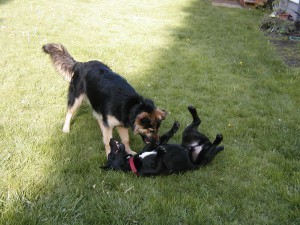Sage Cohen's Blog, page 4
February 21, 2017
Are you building a cathedral?
In one of my favorite allegories, a traveler in medieval times comes upon a stonemason at work. He asks, “What are you doing?” The man looks weary and unhappy. He responds, “Can’t you see I am cutting and laying down stone? My back is killing me, and I can’t wait to stop.”
The traveler continues on his way and comes upon a second stonemason. “What are you doing?” he asks. “I’m building a wall,” says the stonemason. “I’m grateful to have this work so I can support my family.”
As the traveler walks on, he encounters a third stonemason who seems to be doing exactly the same work as the previous two. He asks the man, “What are you doing?” The man stands up straight. His face is radiant. He looks up at the sky and spreads his arms wide. “I am building a cathedral,” he answers.
All three workers are technically doing the same work: laying the stones of an edifice. But the story they tell themselves and this traveler about their labor shapes how they feel—and most likely the quality of their work.
At my Fierce on the Page launch event at Powell’s City of Books, I shared this allegory. I passed out index cards and invited everyone in the audience to name their cathedral. Then, together, we placed our “cathedral” cards on an altar built by my beloved, Mark. This is a glimpse of the hundreds of big dreams we ignited together that evening.
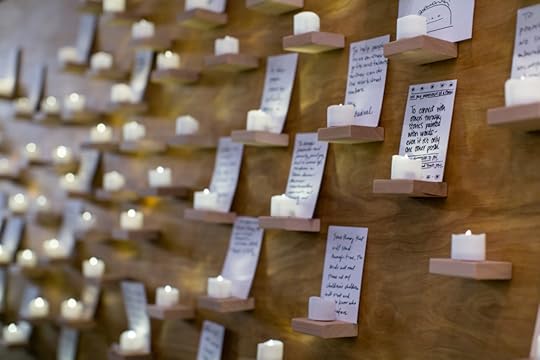
Here are a few of the “cathedrals” that were named and claimed:
“To write poems that are so strange, vulnerable, uncompromising, and emotionally true that they call others to unbury their pain and heal it.”
“To encourage each person to find their love of learning.”
“To change the conversation about the treatment of animals.”
“To help women find their voices!”
And now I ask you: Which stonemason are you?
Are you the first laborer, producing writing fueled by a sense of drudgery and defeat, perhaps focused on praise or publishing or competition or envy, and discouraged by how slow the process is, or how intermittent the affirmation along the way?
Are you the second laborer, focused on doing quality work and appreciative of the evolution of your craft and results?
Or, like the third stonemason, do you have a vision so compelling, so meaningful, that it fills you with a sense of joy and purpose to show up at the blank page day after day as you do the righteous work of erecting your cathedral?
I believe that no matter what story you may have been telling yourself until now, everyone has a cathedral we are building (and writing) toward—an energy source that can fuel our work for a lifetime. If you haven’t named yours yet, I invite you to lift your eyes a little higher.
What is your cathedral?
Try writing it down and posting it in a sacred space in your home, maybe with an electric votive candle flickering beside it. Then reference this declaration any time you are stuck, afraid, or need a boost.
I’d also love for you to share your cathedral here. Because something alchemical happens when we articulate and share our big dreams, commitments, and visions—and are witnessed by people who are invested in our success.
January 26, 2017
We’re better together
Writing is commonly thought to be a solo activity. But I believe that a sustainable writing life takes a village. When we feel connected to community and are engaged in collaboration, our productivity and satisfaction can exponentially increase. When we gather to share our work, explore our ideas, and declare our intentions, we increase our odds of success. {tweet it}
Why? Because being witnessed adds accountability. Witnessing others is inspiring and invigorating. And seeing ourselves in the context of a tribe of writers who share our commitment and passion gives us a sense of belonging that can be hugely mobilizing.
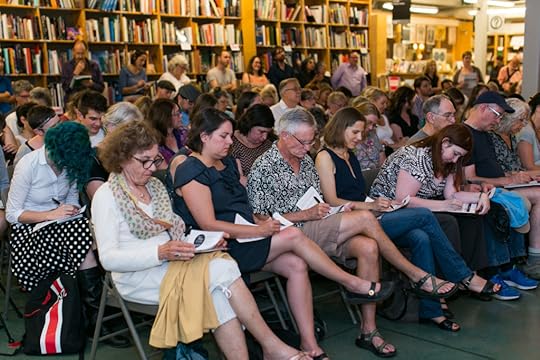
This is why I teach, lecture, coach, and attend readings (both as reader and listener). And it’s why I encourage you to find an event in your community that brings you together with writers like you. If you happen to be in traveling range of Oregon, I’m offering a number of live events in the coming months, and I’d love to have you join us.
Let’s see how much better our writing lives can be when we take them on together.
Write and Publish Fierce with Sage Cohen
Wednesday, February 15, 2017 // 6:30 to 8:30 p.m. // Salem, OR
Producing the writing and publishing results you want may have more to do with your habits than your craft. In a free interactive lecture + workshop with detailed worksheets, I will share my top 10 strategies for writing and publishing fierce.
Move it Through: A Day of Writing and Dance Renewal
Saturday, March 18, 2017 // 10:00 a.m. to 7:00 p.m. // Portland, OR
Is grief or hurt or fear weighing you down? Would you like to have more freedom, ease, or relief in your mind and body? Are you yearning to tap into new discoveries and possibilities? Author and facilitator Staci Boden and I will take you on a dance and writing journey to help you discover new ground for yourself and your writing.
Fierce on the Page Open Mic Reading with Sage Cohen
Tuesday, April 25, 2017 // 7:00 to 8:00 p.m. // Vancouver, WA 98662
I’ll read a bit, and so can you!
Redefining Relationship: A Reading
Saturday, April 29, 2017 // 7:00 p.m. // Portland, OR
Artist Erin Leichty’s Re-Connection exhibit explores themes of losing and regaining connection to ourselves, our families, our communities and our country. Immersed in the gallery featuring her incredible work and inspired by her vision, this reading will feature some of Portland’s most powerful writers exploring the theme of redefining relationships—with our families, our enemies, and ourselves. I’ll be hosting this event and reading with Sara Guest, Christi Krug, Nikki Schulak, and Leanne Sype.
Writing and Finishing Fierce Poems Workshop
Sunday, May 21, 2017 // 2:00 p.m. to 4:00 p.m. // Newport, OR
Could you find a literary event in your community right now that appeals to you—and schedule it on your calendar? Declaring your intention to attend in the comments below could give you a little more motivation to follow through.
{Photo by lizilu photography}
January 19, 2017
Are your writing goals big enough?
“I kept hearing advice, like ‘just get out of bed, just make pot of coffee.’ If my goal is only to get out of bed, I’d never accomplish anything,” she said. Her advice to others coming out of a difficult situation? “Set goals impossibly big — look at the big picture.”
The headline got my attention: “Single mom builds 3,500-square-foot home by watching YouTube tutorials.” Who in the world does such a thing? Turns out, Cara Brookins does—and did.
This mother of four kids ages 2 to 17 who had recently left an abusive marriage found an abandoned home destroyed by a tornado and rebuilt it with her kids in nine months. Did they know how to build a house when they started? Nope. But they learned as they went. Each night, they watched YouTube videos to teach themselves the skills they would need the following day. Together, through shared labor and commitment, they resurrected a home and a family.
Reading of this seemingly impossible triumph, I had a revelation about my own process and experience as a single mother and a writer. Like this audacious woman, I also tend to set goals that seem impossibly big. Not because I believe I can accomplish them. But for the opposite reason: I think so little of myself that I don’t believe I can do most things.
The way I have learned to build trust in my capacity throughout my lifetime is to repeatedly throw myself before the oncoming train of a commitment so big and so scary that I feel I must learn how to do the thing (run the business, write the book, present at the conference) to survive. This bizarre but effective practice has kept my attention trained to a bigger problem than my own unfriendly inner voices. And it’s enabled me to accomplish a wide range of goals I never actually believed possible.
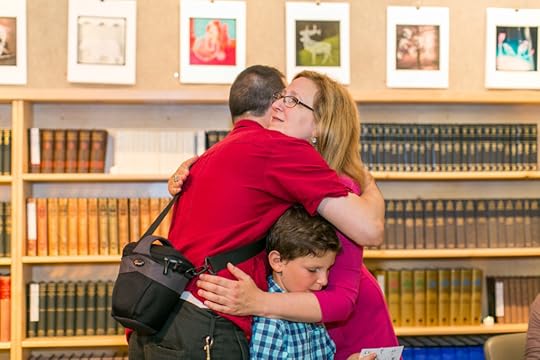 For example, when I was in the mosh pit of my divorce process and feeling so profoundly wronged and hurt by my ex-husband, I made a decision that I would find a way to be happy with him, to regain my love and respect for him, no matter what. And over the course of about five years, I got there. Behind this “impossible” goal was a deep and powerful purpose: I believed that my enduring friendship with my co-parent would create the best context for our son to flourish. During that life chapter, I don’t think I could have gotten out of bed for anything less.
For example, when I was in the mosh pit of my divorce process and feeling so profoundly wronged and hurt by my ex-husband, I made a decision that I would find a way to be happy with him, to regain my love and respect for him, no matter what. And over the course of about five years, I got there. Behind this “impossible” goal was a deep and powerful purpose: I believed that my enduring friendship with my co-parent would create the best context for our son to flourish. During that life chapter, I don’t think I could have gotten out of bed for anything less.
If Cara Brookins and I had focused on simply making it to the coffee pot, we very well may have achieved that goal. But because we each had a much higher purpose of healing our families and impossibly big goals of resurrecting homes and relationships that had shattered, we found a way forward that took us from that cup of coffee into lives that were so improbable as to be completely unrecognizable.
If your writing life has gotten you from bed to the coffee pot but you’re not sure where it’s going to lead you next, or how you’ll get there, I dare you to dream bigger. MUCH bigger. Set an impossible goal, and fuel it with a purpose that is essential to who you are.
You may or may not arrive at your intended destination, but I believe this is beside the point. If you’ve got your sights set on something that matters more to you than your fear or doubt, you’ll walk (and write) through any fire to keep moving in that direction. As you go, you’ll discover strengths and capabilities you never knew you had. You’ll reach vistas you’ve never imagined seeing. And you’ll come to appreciate more fully that you can count on yourself to be brave, be vulnerable, and keep going.
January 3, 2017
Are you the poetry lady (or man)?
As my dog, Hamachi, and I descended our front steps into the well-worn rhythm of our morning walk, a car pulled into the space behind my own at the curb. Machi and I both pricked our ears in anticipation as the man behind the wheel got out and strode toward us. Was he delivering a package? Did he need help with something?
“Hi!” he glimmered, face open and friendly, curly hair tinged pink. “Are you the poetry lady?”
I paused for a beat, trying to make sense of what this man was asking me. I looked at the wooden box facing the sidewalk in which I display and share poems by my favorite poets every week—and understood his question to mean, “Are you the lady who puts out the poems?”
“Yes, I suppose I am the poetry lady,” I smiled.
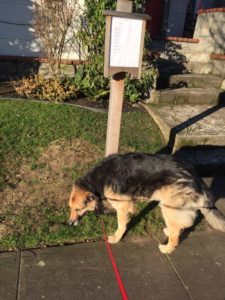
“I was just coming by to see your latest. I used to live in the neighborhood, and for two years I’d collect each new poem on my daily dog runs. They were all uncannily relevant to my life. And now I’m in town visiting and wanted to see what you had out today.”
This man was so excited about the poems I share that he’d driven to my house from wherever he was staying to collect one. Such an act was beyond my imagination.
“I’m so happy I bumped into you today,” he beamed. “I want you to know how much your poems have meant to me over the years. Can I hug you?
For years, I’d been printing 15 copies of the poem I needed most each week and making them available in the small poetry box in front of my home. These poems disappeared every week into strangers’ hands, but I never though much about that part. Schooled by Rumi’s “Love Dogs,” I wasn’t seeking feedback. It was in making my offering that I felt aligned with the divine.
And now the divine was sending a message back, through this man.
We hugged, he got into his car with my very last copy of John O’Donohue’s “May the Light of Your Soul Guide You,” and Machi and I shuffled off to our slow loop.
I’ve had poems torn up, others rewritten; even strange, angry notes left for me. And now, I had a single, known reader who had gratefully received what I offered from my deepest well of self. Making this connection with another lover of poems felt better than any news of publication or notification of award I’ve ever received.
I was reminded that when we offer what we love to the world, when we risk making ourselves visible, we have the opportunity to authentically connect with people. We have the privilege of inviting them to connect with themselves. And whether anyone likes what we have to share or not, taking this kind of risk brings us closer to ourselves.
Are you the poetry lady (or man)? To what name or title will you answer this year? What will you offer to the world in 2017 that is so essential to who you are that the risk of exposure is overshadowed by the enormity of joy in simply making yourself visible? {tweet it} Whatever it may be, I believe there is someone out there poised to drive across town to receive it.
May bravery be the path to inheriting yourself—and connecting with your true tribe—in 2017 and always.
December 20, 2016
Yes, no, and what really matters
It’s that time time of year when many of us are reckoning with how 2016 went down while also anticipating what 2017 will be. Here at Sage Headquarters, I’m appreciating a practice I’ve adopted this year that makes this process a bit more streamlined than usual. It started like this.
When I turned 47 this year, I promised myself that I’d start living like a woman of my age—meaning that it is no longer realistic to expect that I have the energy, stamina, and brainpower of a 27-year-old woman. It has taken me much of the two decades between these two ages to learn this lesson, because I have endless goals and dreams along with a great many responsibilities.
After reckoning with the truth of my not-quite-superhuman resources, it was time to come up with a system for prioritizing my commitments. That’s when I made myself this diagram.
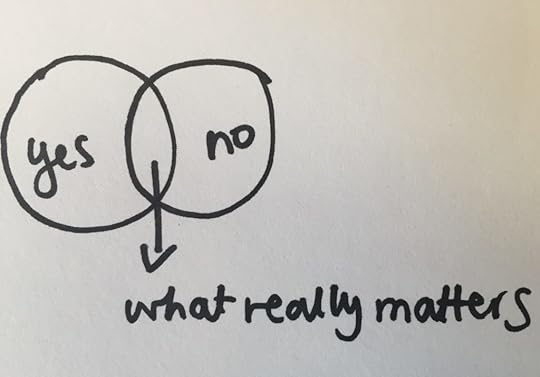
What this means to me is: When I clarify what really matters to me, it’s far easier to identify when to say YES. And because every YES requires saying NO to other possibilities, it’s far easier to let go of those opportunities when I am clear about their lesser importance.
This approach has helped me manage my time, energy, and money far more effectively. For example, because publishing Fierce on the Page was a top priority for me in 2016, I said NO to a number of client projects, social invitations, and volunteer opportunities that would have made it impossible for me to deliver on this commitment. And when I made a contribution in your honor to Together Rising in response to the devastation in Aleppo, I identified how I would reduce spending elsewhere to make up the difference.
See what I mean? Every YES anchors our deepest commitments and greatest goals. And every NO frees up more resources to fulfill them. {tweet it} When we clarify what matters and stay grounded in that sweet spot, we don’t have to perform like a 27-year-old for the rest of our lives. Because we’ve aligned our time, energy, and money with what we really want. And this gives us the best chance of getting it.
How do you manage your time, energy, and money in a way that reflects your desires and values? What will you say YES and NO to in 2017?
November 23, 2016
There is a crack in everything
I believe we don’t live in our lives; we live in the stories we tell about our lives. What happened is far less significant than how we interpret what it means to us—and how this leads us forward.
Which is why I have dedicated a lifetime to studying the possibilities of language, poem, and story. One of my great teachers on this path has been Leonard Cohen. This singer-songwriter-poet first insinuated himself into my nervous system with this chorus from his song Anthem:
Ring the bells that still can ring
Forget your perfect offering
There is a crack in everything.
That’s how the light gets in.
 Throughout my adult life, I have clung to this wisdom. I made it my North Star. I developed a practice of living alongside the unsolvable, of welcoming myself as I am, of leaning into my deepest fissures in search of illumination. In effect, a single chorus of a single song has initiated me into the alchemies of acceptance and transcendence.
Throughout my adult life, I have clung to this wisdom. I made it my North Star. I developed a practice of living alongside the unsolvable, of welcoming myself as I am, of leaning into my deepest fissures in search of illumination. In effect, a single chorus of a single song has initiated me into the alchemies of acceptance and transcendence.
And because I have persistently sought the light through my broken places, this is where I have learned to find it.
When Leonard Cohen left us a few weeks ago, I was already immobilized by reflections of my culture and my country that I could not yet comprehend. I looked to poems, as I always have, to help me navigate my grief and return to center.
These are some of the poems that help me let the light in. I offer them to you with respect for your broken places and gratitude for your commitment to show up at the page and navigate by the truth of what moves through you.
A Ritual to Read to Each Other by William Stafford
The Well of Grief by David Whyte
May you read and write exactly what you need to find your true way forward—now and always. And may each offering you make bring you closer to what illuminates you.
Wishing you and yours a nourishing Thanksgiving.
P.S. What poems, stories, or books do you turn to for help letting the light in? I’d love to hear!
October 17, 2016
Gerri Ravyn Stanfield on story medicine and revolutionary healing
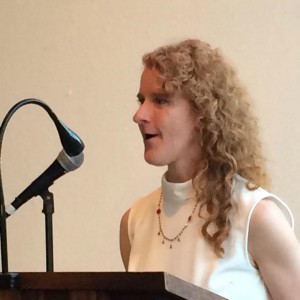 I first discovered Gerri Ravyn Stanfield when a friend forwarded her newsletter to me. Poems are my medicine, and I felt inhaled by the poem Ravyn had shared–and then breathed back into the world more awake, more aware, more myself.
I first discovered Gerri Ravyn Stanfield when a friend forwarded her newsletter to me. Poems are my medicine, and I felt inhaled by the poem Ravyn had shared–and then breathed back into the world more awake, more aware, more myself.
This led me to acupuncture treatment with Ravyn, through which we restored some of my core stories and foundational strengths.
Ravyn radiates wisdom, kindness, and compassion. The guidance she has offered through metaphor and story have been as much a part of my healing journey as the acupuncture. I am so grateful she has made this transformational wisdom widely available in her new book Revolution of the Spirit: Awaken the Healer—which I believe every writer and every human needs on their bookshelf. It is a great honor to discuss some of the insights from Revolution of the Spirit with Ravyn here.
What makes a person a “revolutionary healer”? Does everyone practice some kind of medicine? Do we all have something to contribute to our collective healing?
The root of the word healing is the Old English hal, which means to make whole. No matter who you are, there will be a time in your life where you must heal something that is broken. Maybe that something is your body, or maybe it’s a broken heart. Maybe that something is the state of the world around us.
If you use your life to mend what’s broken, you practice some kind of medicine. You might not know the name of your kind of medicine yet, or you might know exactly what I mean, because you have healed in this way ever since you were a child. We have to expand our definition of healing to encompass all the ways we positively contribute to our communities. I dare you to interview the ones around you to find out how you make their lives more wonderful. Their answers will reveal some of your medicine.
It sounds too simple to be true, but to practice your medicine is to do the thing that you do well. When you do that thing you do, it heals every one of us. It is part of why you are here, the unique soul fire that you bring to this time. And the gift you have to share is likely part of your deepest wounding, some initiation that you have survived. You have certainly made it through some kind of hell and you can show us how you did it, help us along, allow us to learn from your experience.
The revolutionary part comes when we recognize that the skills of the healer, (to listen and observe, diagnose, treat/act and reassess) need to take center stage in these uncertain times. For thousands of years, we did not split human beings into compartments. Body, mind, soul and spirit often needed similar treatments to become whole again. All revolutions involve that which is sacred to us. We aren’t here so much to save the world but to heal the damage within our reach, to find the most important problem to which we are part of the solution, to accept our own unprecedented healing powers and take action. It is going to take all of us to mend this world.
You practice acupuncture. As an acupuncture patient of yours and now a reader of your book, it seems to me that you also practice story medicine. Can you tell me how this works? How do you use story as medicine, and how can other writers do the same?
I wrote this book about healing the world because sometimes, words are everything we have. Storytelling is one of our most potent human medicines. To write is to clasp hands with the place where all stories are born. The best tales spring from our collective unconscious dreamscape and we understand ourselves more deeply when we hear them. There is something deeply healing about living inside a universal story. I am a cancer survivor and in my acupuncture practice, I treat a lot of women surviving cancer. If we lived in another time and society, cancer could be viewed as an initiatory experience, literally facing death and transforming ourselves. When I ask my patients if cancer feels like an initiation, no one has ever told me to piss off, in fact, they ask more questions about initiation or they get tears in their eyes. The only way I survived my surprise divorce after 17 years of marriage was to write the story one hundred different ways. I especially like the medicine of taking the painful events of the present and putting them in the middle of the piece, then writing the climax and the end. When we practice story medicine, we become alchemists. You must begin with the insurmountable obstacle and transform it until you no longer recognize it because it has been polished into something that shines.
What does it mean to dream the beginning of the world instead of the end, and how do you do this?
I get out of bed to see what will happen next in this chaotic human experiment of life on earth in these times. I wake to see who is channeling beauty and serving the power of art and where the inspiration lives today. In my classes, coaching and acupuncture practice, I get to train global revolutionary healers and hold space for people during their alchemical transformations. I write stories and make art to help us create the beginning of the world, not just the apocalyptic fantasies that Hollywood is fond of making. I practice hope as a martial art. I repeat to myself, “every day is sacred”. In our current industrialized culture, I see interlocking systems of oppression, like a web of lies, systems that try to convince us that some humans have more value than others. I want us all to unravel that web and reweave a world of justice and fierce love with our words and actions.
How has allowing love and beauty in contributed to your own healing? And why is it revolutionary to do so?
I have been terrified to love people on and off for my entire life. What a scary freaking thing we do, to make other humans vital to our survival when we will certainly lose them in some way. And without love and support, I shrivel up and fall down under the weight of trying to do it all by myself.
Every time I ask for help, I remember my interdependence in the web of life. Each time I allow someone to see me when I am feeling small, I remember what is sacred to me, what matters most to all of us. I will give you a hint, it is not money or greed. When we recognize what is sacred in the modern world and act on its behalf, that is revolutionary. That is fierce love.
You offer some provocative revolutionary healing dares that invite readers to stay with their own stories, and others’ stories, long enough for them to become alchemical and surface their treasure. I wonder if you might leave my readers with such a dare?
I dare you to ignite your soul fire, your healing gift. Stop comparing yourself to other people. Fall in love with your wounded healer self, in all your imperfections and bad habits. There is a tiny divine flame inside your heart that fuels everything you do. It only wants to dance and shine. Listen to your intuition. It is your job to tend your heart flame when life gets cold and play with it as much as you can. Reignite your soul fire when it goes out. You are incendiary. Find your tinder. Strike the match. You are the only one who can make the spark.
===
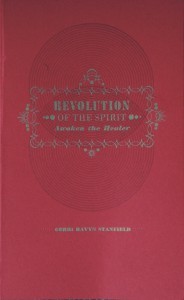 Gerri Ravyn Stanfield is the author of Revolution of the Spirit: Awaken the Healer, a guide to liberate the healing super powers within each of us. She practices acupuncture in Portland, Oregon and works with Acupuncturists Without Borders to build world healing exchange programs. Ravyn designs trainings for emerging leaders and healers in the US, Canada, Europe, Asia and Australia. She teaches at various conferences and festivals, including EDGE, Symbiosis, Pantheacon, Spiritweavers, Bioneers, Lightning in a Bottle and various spiritual and artist retreats all over the world.
Gerri Ravyn Stanfield is the author of Revolution of the Spirit: Awaken the Healer, a guide to liberate the healing super powers within each of us. She practices acupuncture in Portland, Oregon and works with Acupuncturists Without Borders to build world healing exchange programs. Ravyn designs trainings for emerging leaders and healers in the US, Canada, Europe, Asia and Australia. She teaches at various conferences and festivals, including EDGE, Symbiosis, Pantheacon, Spiritweavers, Bioneers, Lightning in a Bottle and various spiritual and artist retreats all over the world.
Ravyn is a cultural alchemist, writing to transform the heartbreak of our times and reveal the gold in what seems worthless. She creates modern ritual art, combining music, poetry and performance to make contemporary offerings of the human imagination. She uses her background in trauma recovery, neurobiology, psychology, writing and theatre to coax more of the extraordinary into the world through the cracks in Western civilization. www.gerriravynstanfield.com , https://www.facebook.com/GerriRavynStanfield/?fref=ts
Geri will be reading with the Fierce on the Page Reading Series on Wednesday, October 26. If you’re in the Portland, Oregon area, you won’t want to miss this.
October 6, 2016
Mantu Joshi on writing and living fierce
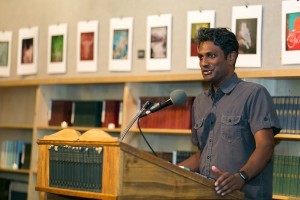 Mantu Joshi wrote me in 2014 to tell me that my book The Productive Writer had helped him believe he could write a book. In two hours a week for two years, he wrote that book. And now it was published. He invited me to his book launch reading for The Resilient Parent, which happened to be in my city. I attended.
Mantu Joshi wrote me in 2014 to tell me that my book The Productive Writer had helped him believe he could write a book. In two hours a week for two years, he wrote that book. And now it was published. He invited me to his book launch reading for The Resilient Parent, which happened to be in my city. I attended.
I wept through the entire reading. This man’s wisdom, grace, and beauty humbled me, awakened me, softened me. And in this receptive state, I had unprecedented discoveries about my own family’s healing process as we moved through divorce into separate but blended lives. I believe Mantu’s “raw-edged and love-powered approach to practical mindfulness for anyone struggling to keep their sanity in difficult relationships/circumstances” can help you engage more deeply in the possibilities of any challenge you are facing.
I am thrilled and honored to introduce you to Mantu here, through our conversation about the fierce writing life.
How has parenting two children with neurobehavioral special needs made you fierce—in writing, and in life?
When you have the unending work of parenting two very young children with special needs, your brain turns to mush. Fatigue on top of fatigue creates a distortion of your own self-care, like a milk container you forgot was in the back of the fridge, you know something is off back there, but it is easier not to face it. Fierce writing is having the courage to reach back there and rather than pinching your nose, you take a generous whiff. . . and you gag on your own vomit. When you find your way to air, you write that down. For me, the writing became a way of cleaning out the fridge. I wrote about what was keeping me sane (mostly) and healthy. The result was something that helped people clear out their own existential messes.
You wrote The Resilient Parent in only two hours a week, over the course of two years. How did you sustain your focus, commitment, and momentum throughout this span of time?
Because I only had two hours, I actually had to remove any ambition or expectation in my writing. A professional opera tenor cannot sing in his upper register unless he completely lets go of tension and lets his larynx flip unhindered. Not to let go completely actually causes vocal damage. This would be like an Olympian who doesn’t stretch before a floor routine. I was handling my own trauma, so I had to be gentle with myself. I also made a rule that I would only write during those two hours. If something came to me outside of that time, I made a post-it note of a key word, and then I put it aside. I simply had no time to do it any other way. And no energy to force anything.
When I came to the writing, I imagined my good friends around me. I took in a warm cup of something with chocolate. I read a bit from your book, The Productive Writer and then I wrote as if I was listening in on a conversation in the coffee shop around me. I simply recorded what my mind had already chewed on on its own. I wrote the pieces mostly front to back with no editing. I did not look back for several months at a time. I focused only on the writing before me. When I was about half-way finished, and now was under contract to finish the book, I just decided to pretend that there was no pressure.
Was there momentum? I did not experience it as momentum. It felt more like words tumbling and then falling in the order they wanted. The ferocity was in a focus on letting go. In that space and freedom, came something that was already there, just out of reach until I wrote it down.
Oh, and I watched no TV, almost no radio, and stopped reading Face Book for almost two years. This forced my under stimulated mind to come up with something. Laying fallow during the week seemed to supercharge my creativity. Instead, I read Hemingway, and took a fifteen minute bath each night to settle down. And I did the unthinkable for me before. I just slept an extra hour each night. Since I was being woken two, three, or even four times each night, this was essential to my writing power.
What did writing this book teach you about who you are, what you believe, and what you have to offer?
For me, writing the book was a lot like standing at the back of the boat and watching the wake behind you. I was able to look hard at my own limitations. I was also able to see that I had become something new. I was able to look back on my own strength and capacity for resilience.
What qualities or practices or beliefs do you believe are at the core of resilience?
The core of resilience is grace. Something greater than you is reconciling and making things right again. But we are also social beings. So the core of resilience is helping each other to regulate our emotions, and coaxing each other back toward wholeness. Co-regulation and processing grief well are two often overlooked keys to finding your ground.
Resilience is not about staying sane or handling stress well. It is not about bouncing back. We never bounce back. Real resilience is holding on to your people and your beliefs in such a way that the hard stuff takes you to a new place. True resilience is letting go of where you were, and embracing the new becoming of who you will soon be. A caterpillar does not try to survive the enzymes and cell changes that eat it alive in the cocoon, only to crawl out of the situation. The only way out is to discover a totally new way of being. This new meaning making is the key to resilient people.
You are a minister and a chaplain. And you have described your “brokenness” as significant asset in this work. Can you tell me what the gifts of brokenness are in your life and your work?
One of our children became so violent, that we had to remove him from our home permanently. A loss of a child in this way is as traumatic as losing a child through death in a car accident. Your brain changes permanently with the loss. It is in a way broken from trauma.
But trauma can be a gift in a way. What I have found is that my internal brokenness is a posture, both of humility and an invitation to others to be broken too. Accepting yourself is also accepting others. Your heart and mind don’t know the difference. People sense that you are not going to judge them. Writing without judgement for yourself or your readers generates a kind of freedom. Transformative writing can only truly happen when planted in the broken freedom places. These are the spaces for new meaning to take place.
===
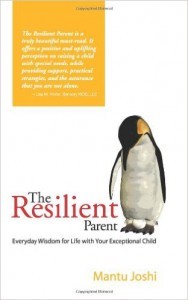 Mantu Joshi is the author of a raw-edged and love-powered approach to practical mindfulness for anyone struggling to keep their sanity in difficult relationships/circumstances. His book The Resilient Parent: Everyday Wisdom for Life with Your Exceptional Child has changed thousands of people’s lives. Contact him at theresilientparent@gmail.com or Facebook.com/theresilientparent.
Mantu Joshi is the author of a raw-edged and love-powered approach to practical mindfulness for anyone struggling to keep their sanity in difficult relationships/circumstances. His book The Resilient Parent: Everyday Wisdom for Life with Your Exceptional Child has changed thousands of people’s lives. Contact him at theresilientparent@gmail.com or Facebook.com/theresilientparent.
Mantu will be reading with the Fierce on the Page Reading Series on October 26. If you’re in the Portland, Oregon area, you won’t want to miss this.
August 29, 2016
Raise your set point
How would you act if you were sure you deserved the writing life you want?
I ask this question in a chapter titled “You’re Worth It” in Fierce on the Page, my latest book from Writer’s Digest Books. In it, I propose that if you don’t think you deserve success, it doesn’t matter how many great productivity strategies you’ve tried. It doesn’t matter how many followers or likes or subscribers you have. It doesn’t matter how many publication notches you have on your belt—or how celebrated you are.
In fact, I believe that your worthiness story could be the undiagnosed roadblock between you and everything you want most. And I am inviting you to bust through to the other side. Here comes my best idea for doing so—one not covered in Fierce on the Page.
Psychologists say smiling makes you happier. And I believe raising your set point is a similar practice, through which we can elevate our own sense of worth. What I mean by raising your set point is breaking through your own glass ceiling of what you think you’re allowed to have, accomplish, ask for, or succeed at—by trying things that seem out of reach, without attachment to outcome.
A few examples of ways I raise my set point are: submitting to my dream publications, raising my rate with clients, asking for help (and even for acknowledgement) when it makes me cringe to do so, and most recently, requesting blurbs forFierce on the Page from my literary heroes.
When I flex these muscles of reaching higher than I’m comfortable reaching, I gain strength and flexibility. I gain courage and faith in myself as a person willing to risk and fail. And sometimes, I even succeed at whatever I’ve attempted.
For example, when requesting blurbs, I focused entirely on how great it felt to reach out to beloved authors, tell them what their work meant to me, and make my Big Ask. When several of the authors said no, as I expected they would, I celebrated that they’d taken the time to write me back. And when Lynne Twist, Paulann Petersen, Lyanda Haupt, and Shanna Germain agreed to blurb my book, their confidence in my work fortified my own.
One of my favorite strategies for raising my set point for many years was: Pretend I am Pam—a dear friend and colleague who I found all-around more worthy than I was. I’d pitch clients and speak at conferences and negotiate contracts while channeling this Pam-ified version of myself—until eventually, I’d raised my set point high enough that I didn’t need that layer of disguise.
You may not realize that you’re scrunched down under your own limited sense of worth until you stretch a little higher out of that comfort zone. The more you stretch, the more comfortable you’ll get with your elevated vista point.
I’m not proposing that this guarantees you’ll accomplish everything—or even anything—you’re reaching for. But I am certain that the risks you take become far more valuable when you regard them as investments in your own confidence and self-regard.
The set point is in your hands. You get to decide how high you are willing to grow.
===
If you’d like to experiment with raising your set point in my company, I’ll be teaching at some fantastic events in Eugene, OR, Los Angeles, CA, and Salem, OR in the coming months. You can learn more here. I’m also very excited to be launching the Fierce on the Page Reading Series in Portland, OR in September! Each month, I’ll feature three writers from a range of disciplines and genres who share their work and then discuss what it means to be fierce on the page. Stevan Allred, Kristin Berger, and Nikki Schulak will be rocking the podium at our inaugural event on September 28. Can’t wait to see you in person!
August 25, 2016
And then there were none
There is a woman in my neighborhood who walks.
13 years ago, when I was new in my house, my two young, strapping dogs jumped her two young, beautiful dogs as they were passing by and we were getting into the car.
In this shocking and unprecedented moment, something deep down in our tribal animal brains was decided. Our packs were enemies. This woman was angry with me. Very angry. I took her anger and made it an armor over my own heart.
We kept walking.
For years, we navigated carefully around each other, crossing the street when we saw each other coming. We were the two most loyal and loving dog people of the neighborhood, scarcely containing our lunges and growls.
Maybe a decade into this carefully cultivated distance, one day this woman’s Malamute was not walking with her. Just like that. He was gone. This hammered hard on the armor of my heart. Every day after that I witnessed her one-dog walk with her stately Rhodesian Ridgeback, my heart percussion of grief for her loss continued.
Soon thereafter, when my soul dog Henry who had carefully walked one step behind me for 13 of my happiest years made his crossing on his short, curvy, atrophied legs to the other side, I too transitioned to a one-dog pack.
For the next several years as we all slowed and aged, our diminished packs remained in steadfast opposition. We continued to keep our distance. Until the day I was driving the slow, winding road to my boyfriend Mark’s house.
Turning a corner, the landscape expanded to wide-angle. As her familiar shape, gait, and visor clarified, my neighbor who loved her dogs as much as I love mine came into focus. She was walking alone.
My longstanding enemy had become a no-dog pack. I burst into tears.
This stranger’s loss was my loss. Her solo walks, which I witnessed many more times on the drive to Mark’s house, were a music of grief and gratitude. I wondered if I ached for those missing dogs of hers as much as she had.
As my own one-dog walk slowed to a one-block, unsteady shuffle with my fierce but feeble elderly Hamachi, I imagined my neighbor and me impressing into our respective pavement our grief for all the love that can only accompany us so far before we must return it to the earth.
The evening after I launched Fierce on the Page at Powell’s City of Books, one of the most important rites of passage of my life, it was Hamachi’s 13th birthday. I was driving to Mark’s house for dinner. My son Theo was in the back seat educating me about his Pokemon Go strategy. As we slowed down for the big curve along the golf course, there she was, my beloved enemy. Walking a new dog. A large, yellow lab. I gasped as a wave of tears erupted in me.
Theo wanted to know what I was crying about. When I explained that the woman I’d been crying about for months because her dogs had died now had a new dog, and I was so happy that I was crying, he took the same kind of polite interest in this nonsensical explanation that I take in his Pokemon tales.
We drove on in silence.
In my lifetime, I have released four beloved pets back to whatever kind and generous force had brought them to me. And I have also released four beloved books into the world, experiencing each publication as a kind of loss of the love that had so thoroughly engaged me in generating and finishing them. Each animal, each book a companion whose journey in my care was complete.
I have come to understand that this is what love asks of us. To give everything we’ve got. To be willing to lose it all. To cry so hard for our enemies that we can no longer discern whose pack is whose. To give our attention entirely to the ground under our feet, the dog or writing project whose company we cherish in this moment we have been given. To receive the enormity of grace, even as it is slipping through our fingers.

